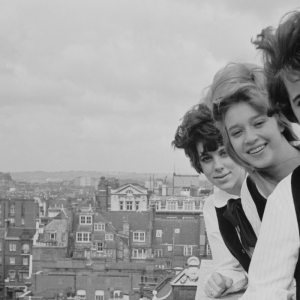Zoom out, and perfection looks real. The messy strokes of a painting are less visible from a distance. But a lovely painting is created inside a cluttered and untidy art studio. Accidents occasionally produce magic through the creative process—like a ghost in the room guiding the artist’s hand. Objects look beautiful, almost flawless, from a great height.
Videos by American Songwriter
The Postal Service’s defining song, “Such Great Heights,” wasn’t composed accidentally, but its commercial breakthrough was unexpected. Call it fate or luck, but two musicians worked together outside of their main projects to produce an early 2000s classic.
Death Cab for Cutie vocalist Ben Gibbard and electronic producer Jimmy Tamborello formed The Postal Service after collaborating on Tamborello’s project, Dntel. Dntel’s song “(This Is) The Dream of Evan and Chan,” released in 2001, was well-received and inspired the duo to keep working together. Jenny Lewis later joined on backing vocals, completing the new lineup.
Because of conflicting schedules with their primary bands, they named themselves The Postal Service, a nod to how the band composed music by mailing tracks to each other. Tamborello wrote and performed electronic instrumentals, then mailed the copies to Gibbard, who’d write lyrics and arrange the pieces into songs. Lewis added backing vocals and joined the band on tour.
A one-off album, Give Up, was released by Seattle indie label Sup Pop in 2003. It was a surprise hit, spawning many bands mimicking the group’s mix of indie electronica and emo-pop vocals.
Such Great Gifts
“Such Great Heights” is a warm, tender love song wrapped inside cold, digital electronica; the meaning behind the lyrics evokes both tenderness and coldness.
The narrator expresses his love onto an answering machine. From the outside, the relationship looks ideal. But the couple chooses to stay where they are—everything looks perfect from far away.
Though distance may be an elixir for this relationship, with a partner on tour, the narrator is left feeling lonely. He misses her and hopes she hears the song on the radio—guiding her home.
And when you are out there on the road
For several weeks of shows
And when you scan the radio
I hope this song will guide you home
In an interview with Rolling Stone, Gibbard said the song was one of the last they completed for Give Up. Like many great songs before, “Such Great Heights” came easy, as if the song was “beamed down to me.”
They will see us waving from such great heights
Come down now, they’ll say
But everything looks perfect from far away
Come down now, but we’ll stay
Dystopian Technology
The video for the song follows two workers in a semiconductor plant, glancing at each other while machinery completes tasks. As one worker carefully passes a silicon wafer to the other, the camera cuts to machines diligently working. The camera quickly zooms out to a satellite orbiting Earth.
At this height, Earth looks blue and round. The close-up reveals mountains projecting from the surface. A city block is brought into focus; then, the block is replaced by a computer circuit. A digital image of the same circuit appears inside the plant.
The video speaks to the fear of emerging technology. By 2003, businesses were already being disrupted by rapidly advancing tech. It had changed information flows and, most dramatically, how people communicated with one another. Myspace launched seven months later. Facebook was only a year away.
TV Killed the Radio Star
“Such Great Heights” was used in several television commercials. The Postal Service licensed music to Target, M&M’s, and, fittingly, UPS. Two years after Napster, the music industry had changed. The iTunes store launched in 2003, and downloading music would surpass CD sales within a decade. Licensing music to advertising agencies created a new and much-needed revenue stream, especially for independent bands operating without the muscle of a major record label. The money kept bands on the road and exposed indie songs to millions of people.
“Heights” also appeared as the theme song to Grey’s Anatomy. The exposure brought The Postal Service to mainstream audiences, and Grey’s Anatomy became a new place to break songs. A placement on the popular ABC show rivaled the exposure artists got on the radio; the FM dial’s stronghold on the music industry was slowly starting to deteriorate.
Give Up received little promotion, but TV placements and word of mouth made it a surprising success. It sold more than 1 million copies and became the second biggest-selling album in Sup Pop’s history to Nirvana’s Bleach.
By late 2003, Gibbard and Death Cab for Cutie released a breakthrough album, Transatlanticism. With the success of The Postal Service, Death Cab’s new album became highly anticipated. After a half-decade of touring, Gibbard and company finally had a commercial hit. And much of it had to do with the unexpected success of his side project.
The Universe Doesn’t Care About Your Plans
Death Cab for Cutie signed to Atlantic Records following the success of Transatlanticism. The ensuing album, Plans, was a massive success, too. The irony of Plans’ title is the unplanned success of both bands.
Technology has expanded human consciousness. It can make life easier. But what humans are really after is order. Order is the hoped-for result of making plans. But life is nature’s technology, acting as its own disrupter.
Give Up doesn’t have to mean defeat. It also means to surrender control. Humans can’t control everything, not even with a well-executed plan. Sometimes, it’s better to move with the wind.
Feel the power and nostalgia of indie music legends! Grab your tickets for the Death Cab Postal Service Tour now and immerse yourself in their iconic hits.
Photo by Kevin Winter/Getty Images for Coachella
